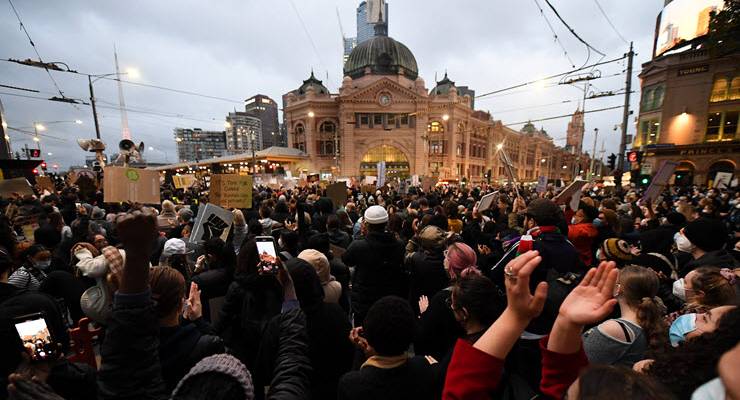
Australia’s run of low case numbers continues. A person who attended the Black Lives Matter protest in Melbourne last weekend has tested positive for COVID-19. Scientists argue over the origin of the virus. The OECD explains how Australia could beat the recession.
NSW passes a milestone
Australia’s largest state, which has been the worst affected by the COVID-19 pandemic scored a major victory in the road out. Yesterday marked 14 days — the length of one incubation period, without a single recorded case of COVID-19 spread by community transmission.
All recent cases in the state have been returning travellers from overseas.
That milestone has led to pressure on Premier Gladys Berejiklian to further ease restrictions — Peter V’landys wants full crowds back at NRL games, and after pressure from Deputy Premier John Barilaro, Berejiklian announced that gatherings could be increased to 20 people.
It’s also renewed calls from Prime Minister Scott Morrison on states and territories to fully reopen borders. Yesterday, New Zealand Deputy Prime Minister Winston Peters said the closures could delay any Trans-Tasman travel bubble.
How long has the virus been around for?
A new Harvard Medical School study suggests COVID-19 may have been circulating in Wuhan as far back as August last year. The study, which has not been peer-reviewed, is based on satellite imagery of cars outside hospitals, and search engine data (ie more people were googling coronavirus symptoms).
Unsurprisingly, the study has been slammed by China, and gotten plenty of flack from scientists who question its validity. Still, it does provide some further evidence that coronavirus might have been around longer than we thought. Last month, doctors in France and Sweden said their countries may have had cases as early as November.
Recession watch
The Organisation for Economic Co-operation and Development (OECD) is now calling it the worst peacetime recession in over a century.
The pandemic is expected to cause the global GDP to contract up to 7.6% this year. But the latest OECD report has a few silver linings and words of warning for Australia.
Our contraction is estimated to be 5%, although if there’s a second wave, that could be 6.3%. And we could bounce back quicker than most — only South Korea, China and Indonesia will come out better, the OECD says.
But it also warns that our success could hinge on the Morrison government continuing with the JobKeeper scheme. The wage subsidy, which is set to last to September, has already been removed from the childcare sector.
Race watch
Scott Morrison spent the morning on talkback radio, attacking the thousands of protesters who attended Black Lives Matter rallies across Australia last weekend.
After earlier suggesting protesters were responsible for delays in easing of restrictions, Morrison told 3AW’s Neil Mitchell they were disrespectful, and should be charged (although he did not clarify with what). After pressure from the Coalition, Labor MPs who attended the protest got tested as a precaution — they’ve since had negative results.
This morning, Victoria’s chief health officer announced one of the state’s new cases was a person who attended the Melbourne protest. While it’s unlikely they caught COVID-19 at the rally, they may have been infectious while attending.
More protests are planned for this weekend, and NSW Police Commissioner Mick Fuller has vowed to challenge organisers in court — a tactic the cops tried and failed with last week.
Meanwhile Australian politicians trying to prove to Beijing there isn’t racism against Chinese international students have come up against some uncomfortable headlines. A bunch of community groups are calling for a renewed anti-racism strategy to combat a dramatic surge in racist incidents during the pandemic. And Chinese students continue to report on a rise in racist attacks.








Crikey is committed to hosting lively discussions. Help us keep the conversation useful, interesting and welcoming. We aim to publish comments quickly in the interest of promoting robust conversation, but we’re a small team and we deploy filters to protect against legal risk. Occasionally your comment may be held up while we review, but we’re working as fast as we can to keep the conversation rolling.
The Crikey comment section is members-only content. Please subscribe to leave a comment.
The Crikey comment section is members-only content. Please login to leave a comment.